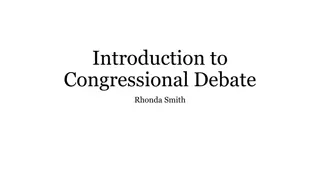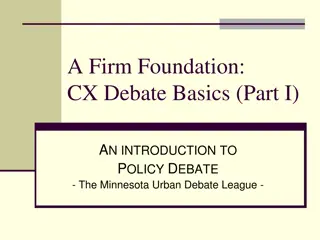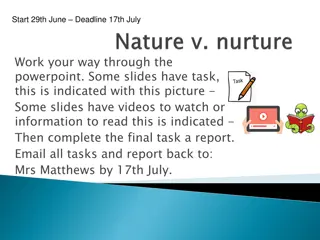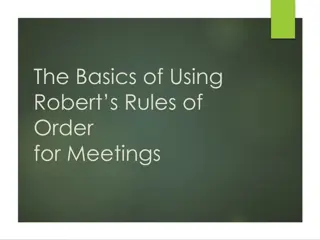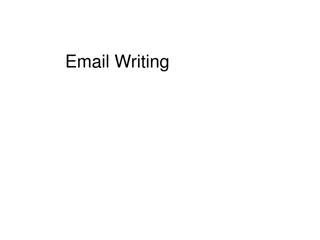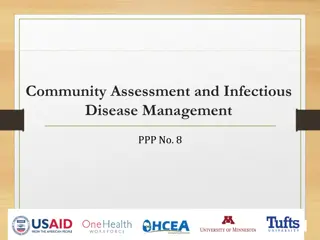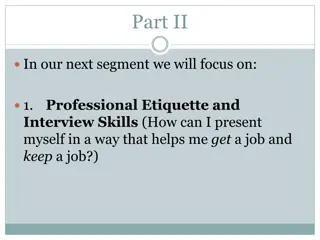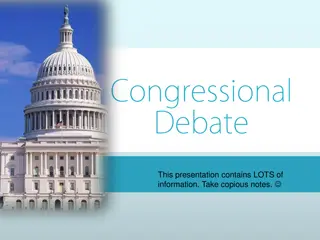Mastering Debate Etiquette: A Comprehensive Guide
Enhance your debate skills with this comprehensive guide on debate etiquette. Learn about pre-debate introductions, flipping the coin, understanding judge paradigms, and in-round etiquette. Discover essential tips for interacting with opponents, making strategic decisions, and maintaining respect throughout the debate process.
Download Presentation

Please find below an Image/Link to download the presentation.
The content on the website is provided AS IS for your information and personal use only. It may not be sold, licensed, or shared on other websites without obtaining consent from the author.If you encounter any issues during the download, it is possible that the publisher has removed the file from their server.
You are allowed to download the files provided on this website for personal or commercial use, subject to the condition that they are used lawfully. All files are the property of their respective owners.
The content on the website is provided AS IS for your information and personal use only. It may not be sold, licensed, or shared on other websites without obtaining consent from the author.
E N D
Presentation Transcript
Debate Etiquette By: Sharmila Nimbkar and Damien Rivera
Pre-Debate Introduce yourself to your opponents a. Just be cool. Make small talk with your opponent's before the round while waiting for the judge. Ask them about their last round, their school, and their teammates. b. Make sure you're not being too loud, though. Other debates are probably still going on in nearby classrooms c. Your opponents are not your enemy. In fact, you can make really good allancies that come in handy by being nice. Wait for the judge before going into the room you re debating in. After the judge gets there, you may enter the room. Sometimes the desks aren t set up, so you may need to move some stuff around. Always be respectful of the classrooms. Make sure the judge is present for the coin flip to ensure there was no foul play. Always ask for judge for their paradigms before you start the round.
Flipping the Coin A coin flip is done before every debate round to decide who speaks first and who will be debating which side. One person from either team will flip the coin, while the opposing team will call the side they choose while the coin is in the air. The winner of the coin flip will get to decide if they want to debate aff or neg or decide the speaking order of the teams. The team that lost the coin flip gets to make whatever decision the winners didn t. Ex. you and your partner flip the coin and call heads. Its tails, so your opponents get first pick. They choose to debate aff. That means you get neg. Since they decided positions, you get to decide order of speaking, so you pick second. If you are the team that gets to choose speaking order between teams, ALWAYS CHOOSE 2nd. Being the second speaking team is extremely advantageous as it allows you to rebut your opponent's rebuttal, lets you use your opponent's prep time, and makes you the last team to speak in the round, which can be particularly beneficial when debating for a newer judge. advantage, especially with newer judges.
Judge Paradigms Paradigm means a preference for how the round should be conducted. Always ask what a judge s paradigms are before the round, as it will allow you to adjust to the judges preferences If sense that you have a newer judge, instead ask them for their preferences for the debate, because paradigms is kind of a technical word. You don't want to alienate your judge with big words. There are some common paradigms that will come up a lot Don't spread - spreading, in debate, is when you talk at the speed of light in order to fit in as much information as possible into your time limit. Its customary in LD, but its very condemned in PF. spreading makes it exponentially more difficult for your judge to follow along. Clash Don t be rude - if you have a lay judge, they can be Key voters weighing
In-round During the round, always be respectful of your opponents when they are speaking or using their prep time. No matter how well you debate, being rude may seriously reduce your chances of winning, especially with a lay judge. Don t talk, laugh, or make faces during your opponent's speeches and always whisper during their prep time and your own. If your opponent's go over time, simply hold up your fist to indicate that time is up. If they continue to speak for 15 seconds over time, firmly but politely say thats time and leave the rest to the judge. If they continue to talk past that, it will only look bad on them. Maintain a reasonable amount of eye contact with your judge . Make them feel as though you are talking directly to them, but don t stare them down and make them uncomfortable. Ask your partner, judge, and opponent's if they are ready before you begin any one of your speeches. If one of them are still writing, wait.
Prep Time Announce when you are taking prep time and give your judge time before you start it in case they want to time you. You must at least keep track of your own prep time, but it is also a good idea to keep tabs on your opponent's as well. Don't prep when your opponents are looking at cards. Anytime you are prepping, your opponents should get an equal opportunity to get prep time in as well If it s your turn to speak, and you aren t ready, take prep. Don't try to squeeze in one last sentence, talk to your partner, or organize your rebuttal without taking prep. If your opponents try to do this for a significant amount of time, just politely ask them if they want to take prep.
Post Round After the round ends, shake your opponent's hand and say something like good debate or good round . If it was a fun debate, tell them. If there are no other debate rounds in that room after yours, help put the desks and chairs back to where they were originally. Don't leave water bottles, quarters, pencils, flowpaper, etc in the room after the round. Leave it spic and span. Do NOT, UNDER ANY CIRCUMSTANCES, keep trying to argue your point to the judge. Don't even discuss the arguments in the round in front of the judge. Even if you had the WORST judge in the world or the most rude opponent's you ve ever met, don t talk about it until the bus ride home. Talking about your judge or opponent's behind their back is risky and could give our school a bad reputation. The walls have ears. Don't ever tell your opponents that you think they should have lost, even if they are your friends.
Post Round (Judge) Always ask the judge for feedback after the round. Even super unexperienced judges can have great advice concerning judge adaptation, if not actual strategy or arguments. Even if your judges advice is straight BOOTY, still listen attentively. If you want, you can ask the judge to disclose the result of the round. Most of the time the judge will refuse so respect their wishes if that's what they so choose. NEVER argue with the judges decision, even if you feel that it was wrong. Never initiate a handshake with your judge. It can be interpreted as you trying to look at their ballot. Sometimes inexperienced judges might try to shake your hand, so just go with it. But as a general rule of thumb, just don't. If your opponent's initiate a handshake with your judge, read the body language of your judge. If they seem unopposed to the handshake, it might seem rude for you NOT to shake their hand. However, if they clearly are uncomfortable with it, just thank them and move on.



